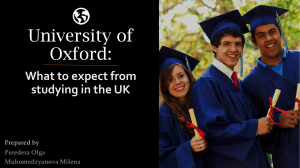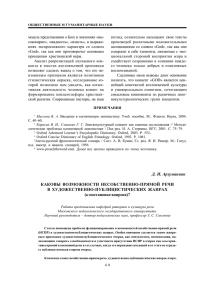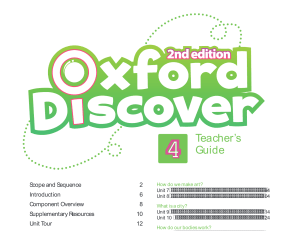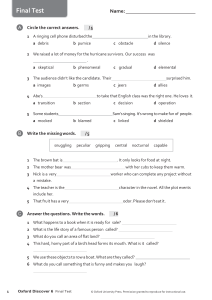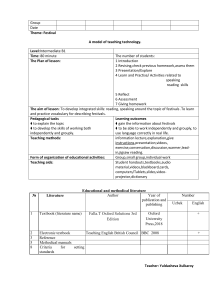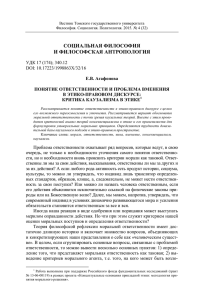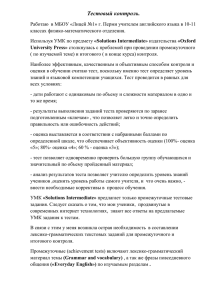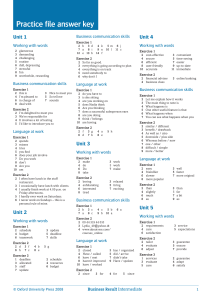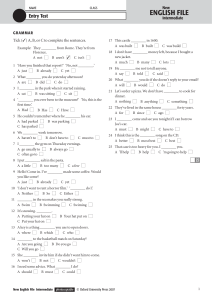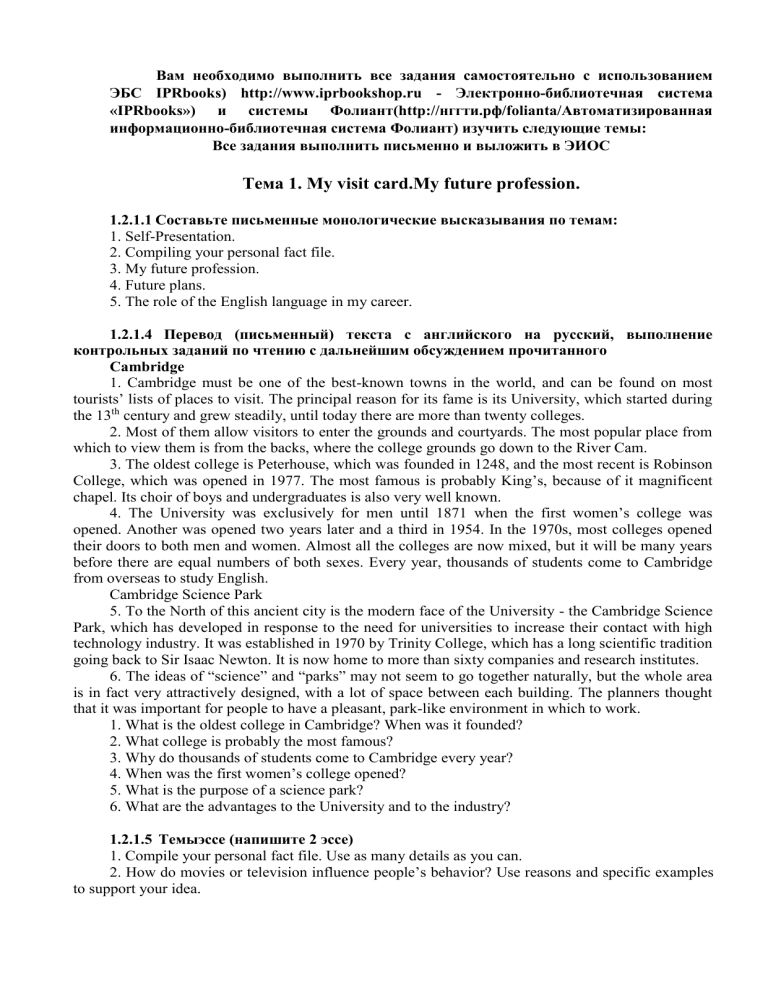
Вам необходимо выполнить все задания самостоятельно с использованием ЭБС IPRbooks) http://www.iprbookshop.ru - Электронно-библиотечная система «IPRbooks») и системы Фолиант(http://нггти.рф/foliantа/Автоматизированная информационно-библиотечная система Фолиант) изучить следующие темы: Все задания выполнить письменно и выложить в ЭИОС Тема 1. My visit card.My future profession. 1.2.1.1 Составьте письменные монологические высказывания по темам: 1. Self-Presentation. 2. Compiling your personal fact file. 3. My future profession. 4. Future plans. 5. The role of the English language in my career. 1.2.1.4 Перевод (письменный) текста с английского на русский, выполнение контрольных заданий по чтению с дальнейшим обсуждением прочитанного Cambridge 1. Cambridge must be one of the best-known towns in the world, and can be found on most tourists’ lists of places to visit. The principal reason for its fame is its University, which started during the 13th century and grew steadily, until today there are more than twenty colleges. 2. Most of them allow visitors to enter the grounds and courtyards. The most popular place from which to view them is from the backs, where the college grounds go down to the River Cam. 3. The oldest college is Peterhouse, which was founded in 1248, and the most recent is Robinson College, which was opened in 1977. The most famous is probably King’s, because of it magnificent chapel. Its choir of boys and undergraduates is also very well known. 4. The University was exclusively for men until 1871 when the first women’s college was opened. Another was opened two years later and a third in 1954. In the 1970s, most colleges opened their doors to both men and women. Almost all the colleges are now mixed, but it will be many years before there are equal numbers of both sexes. Every year, thousands of students come to Cambridge from overseas to study English. Cambridge Science Park 5. To the North of this ancient city is the modern face of the University - the Cambridge Science Park, which has developed in response to the need for universities to increase their contact with high technology industry. It was established in 1970 by Trinity College, which has a long scientific tradition going back to Sir Isaac Newton. It is now home to more than sixty companies and research institutes. 6. The ideas of “science” and “parks” may not seem to go together naturally, but the whole area is in fact very attractively designed, with a lot of space between each building. The planners thought that it was important for people to have a pleasant, park-like environment in which to work. 1. What is the oldest college in Cambridge? When was it founded? 2. What college is probably the most famous? 3. Why do thousands of students come to Cambridge every year? 4. When was the first women’s college opened? 5. What is the purpose of a science park? 6. What are the advantages to the University and to the industry? 1.2.1.5 Темыэссе (напишите 2 эссе) 1. Compile your personal fact file. Use as many details as you can. 2. How do movies or television influence people’s behavior? Use reasons and specific examples to support your idea. Тема 2.From a global language to a global culture.GlobalEnglish. 1.2.2.4 Текст для реферирования, предназначенный для текущего контроля знаний на практических занятиях. Реферат представляет собой передачу краткого содержания текста на английском языке, выражая свое отношение к прочитанному Life at College and University The academic year in Britain's universities, Polytechnics, Colleges of Education is divided into three terms, which usually run from the beginning of October to the middle of December, from the middle of January to the end of March, and from the middle of April to the end of June or the beginning of July. There are about one hundred universities in Britain. The oldest and best-known universities are located in Oxford, Cambridge, London, Leeds, Manchester, Liverpool, Edinburgh, Southampton, Cardiff, Bristol, and Birmingham. Good A-level results in at least two subjects are necessary to get a place at a university. However, good exam passes alone are not enough. Universities choose their students after interviews. For all British citizens a place at a university brings with it a grant from their local education authority. English universities greatly differ from each other. They differ in date of foundation, size, history, tradition, general organization, methods of instruction, and way of student life. After three years of study a university graduate will leave with the Degree of Bachelor of Arts, Science, Engineering, Medicine, etc. Later he may continue to take a Master's Degree and then a Doctor's Degree. Research is an important feature of university work. The two intellectual eyes of Britain – Oxford and Cambridge Universities – date from the twelfth and thirteenth centuries. The Scottish universities of St. Andrews, Glasgow, Aberdeen and Edinburgh date from the fifteenth and sixteenth centuries. In the nineteenth and the early part of the twentieth centuries the so-called Redbrick universities were founded. These include London, Manchester, Leeds, Liverpool, Sheffield and Birmingham. During the late sixties and early seventies some 20 “new” universities were set up. Sometimes they are called “concrete and glass” universities. Тема 3. Career and Education. 1.2.3.5 Перевод (письменный) текста с английского на русский, выполнение контрольных заданий по чтению с дальнейшим обсуждением прочитанного World Universities So many students are today curious to venture abroad to get degrees of higher relevance. However, they should know which of the World Universities can offer those jobs and immediate placement. Some of the top world universities are Harvard, Stanford, Oxford, university of Cambridge and university college London. Even Yale University is counted among the top universities in the world. The admission requirements for all these world universities are different from one another. Harvard is the most ancient American higher learning institute. This is the reason for its excellence. It has existed for almost 300 years now. Being started 140 years prior to the signing of declaration of independence. What’s great about this university is that it has one of the most interactive learning environments in the world. It also provides residential accommodation to its students. It has a massive range of courses for students to choose from under the different domains of History/Archaeology, Humanities, Economics, Creative/Performing Arts, and mathematics, Medicine/Medical Sciences, Physical Sciences, Philosophy, Psychology, Computing/ Information Technology, General Engineering/Other Engineering and Languages. It has a faculty of 2000 professors in the university campus along with 7000 others teaching at the various teaching hospitals under this university. The University of Cambridge is also an interesting option for studying abroad. This university also had many museums, which let students explore its present and old teaching activities of along with some former illustrious students. Students can be assured about the quality of education imparted at this university because it is regulated by the United Kingdom’s Quality Assurance Agency. It can also offer an immense amount of knowledge to its students through well-endowed libraries. It arranges lectures for students from well-known experts in a specific domain. It has 31 beautiful and resourceful colleges out of which 3(New Hall, Lucy Cavendish and Newnan only give admission to females. Both the university and the college do the teaching of the students. However, the degrees are provided by the university only. Yale is also an old university. It was started in the year 1801. Yale has expended tremendously since the time it was started. It set up its medical institution in 1801 and the law school in 1843. Its school of management was the last to be initiated in the year 1974. It also offers courses in Fine arts and music to its students. It became Yale University in 1887. Interestingly, this university offers six courses in engineering and it including Mechanical Engineering, Applied Physics, Biomedical Engineering, Environmental Engineering, chemical and electrical engineering. University College London is also a world university, which offers courses par excellence to its students. It has made an international name for itself in the field of research and teaching. It offers a wide variety of subjects including sciences, social sciences, arts and biomedicine. It was given the title of the best research university in the London area according to the Research Assessment Exercise (RAE) done in 2008. This body recognized UCL as a university that has attained great results in every subject taught here. Tasks 1. Read and translate the text. 2. Make up five questions to the text. Try to use different types of questions. 3. Explain the meaning of the following words and phrases: admission requirements, residential accommodation, university campus, well-endowed libraries. 4. Which university attracts your attention? Would you like to study there? Justify your answer. 1.2.3.8 Задание на составление писем: 1. Compose a resume and a cover letter. 2. Write a letter to apply for a job. 1.2.3.9 Индивидуальныетворческиезадания/проекты Compose your personal career plan according to the following points: 1. What is my ideal job? 2. What are my strengths? 3. What are my weak points? 4. What are my goals? 5. What are my interests? 6. Is my qualification sufficient? 7. What should I do now to develop my skills? 1.2.4 Тема 4.MakingContacts. 1.2.4.3 Перевод (письменный) текста с английского на русский, выполнение контрольных заданий по чтению с дальнейшим обсуждением прочитанного How to Overcome Cross Cultural Communication in Business In global companies, effective cross-cultural communication enables businesses to run more smoothly. By acknowledging the potential problems that can occur and taking proactive steps to minimize conflict, you can help your employees work together better. Adjusting behavior takes time, so be sure to provide opportunities for your employees to learn about each other’s cultures and habits before problems arise. Set expectations throughout your company that additional effort might be required to understand each other. Foster engagement in thoughtful consideration instead of jumping to hasty conclusions that lead to volatile, unproductive conflicts. Step 1 Run meetings to expose your employees to other cultures. Introducing employees who will be working together in a non-threatening environment enables a good working relationship long term. Learning about another culture’s language, rules and norms for acceptable behavior helps prepare your employees to deal with situations as they arise. Changing preconceptions can lead to more conducive working relationships. Step 2 Conduct activities to demonstrate how dependent we are on language. For example, dedicate a day to being silent. Have each employee develop a contract stating what they hope to learn, how long they will remain silent (what exceptions can be made) and how they plan to cope without speaking all day. After experiencing a day with limited communication, participants can typically relate to being in a foreign environment more easily. Step 3 Provide workshops, tips and techniques for communicating effectively in cross-cultural work environments. People act according to the values of their own culture. Others from another culture might interpret behavior differently. Practicing such strategies as active listening (paraphrasing what is said to ensure understanding can be achieved) and using multiple forms of communication, such as written, audio and visual, can enhance employee involvement in assuring that conflicts do not arise because of cultural misunderstandings due to lack of awareness. Step 4 Coach employees mediate conflicts related to cultural misunderstandings. Provide opportunities for employees to respond to situations from viewpoints different than their own. Divide a group of people into pairs to conduct role-playing exercises that allow participants to acknowledge culture difference exist. Encourage each pair to think about a conflict they have experienced recently due to cultural differences. Have each participant describe what they might find offensive or unusual. Let each participant suggest how the problem would be handled in their own culture. Together, have the participants develop a resolution to the problem. Have each pair report to the larger group on their experiences. How do cultural differences affect communication? People living in different cultures have different habits, values and ways of expression. These differences are cultural differences which cause problems when people communicate. The following points can highlight more about such differences: 1. Body movements: Our body sends non-word messages through hands, fingers, eyes, head, face and so on. These non-word messages have different meaning in different cultures, such as: 58 59 Handshake: Americans like to greet by firm of handshake while Chinese do not like much touching to greet. Rather they bow to greet people. Eye contact: In U.S.A people maintain eye contact while speaking to provide importance. Whereas, in Indonesia, looking directly at people considered to be disrespectful. Fingers: Use of two fingers to show victory sign is a symbol of success in U.S.A. The same symbol has a vulgar meaning in Australia. In Japan such sign represents money. Even the use of “thumbs up” means “things are well” in England and U.S.A but it has a negative meaning in Nigeria. Head movement: Up and down movement of the head means “Yes” and a side to side movement of the head means “No” in U.S.A. whereas, up and down movement of head means “No” and side to side movement of head means “Yes” in Bulgaria. Smile: A smile is viewed as a positive sign in American culture but considered as a sign of weakness in African cultures. So, all cultures use body movements during communication but in different ways. 2. Space: Space is viewed differently by different cultures. In some cultures, people maintain distance in other cultures, people want to be close. For example, North Americans maintain two feet distance while speaking. But Arabians stand close while speaking. Americans view space as a “Right” but Arabians view space as “Indecent”. 3. Time: Some cultures regard time as an important factor everywhere but some other cultures view time in a more relaxed way. People from U.S.A, U.K or Europe maintain time efficiently; whereas Arabians are late to show that they are busy. 4. Religion: Religion is an important socio-cultural factor and guides way of living and future thinking. It affects consumption, business and attitude. For example: Trading of liquor is restricted in Muslim countries but open at western world. Moreover “Interest” on loan is prohibited in Islamic banking but very common in commercial Banking. 5. Social values: Social view differs from culture to culture in the following areas: Living style: Some cultures lead luxurious life while others may not. Arabians give emphasis on luxurious life and spend huge during life time. They view luxury as a status whereas Japanese are hard worker and save more and more for future. Class status: In many cultures, questions on occupation, income and job title are asked without any hesitation. But cultures which support human equality avoid such questions. In Bangladesh, people feel free to talk about status but English man hesitates to talk about it. Addressing people: In many cultures, people are addressed by their first name whereas in many cultures, this trend is a symbol of disrespect. In U.S.A, subordinate addresses: their superior as, “Mr. Park”. However, in Bangladesh, subordinate commonly uses the term “Boss”. Role play: The role of women varies widely by culture. In Thai and American culture, women play major role in business. Whereas, in many Arab countries, women still do not play any important role in business. 6. Frankness: First World countries are more frank and open than third World countries. Americans and Germans are more frank than Asians in respect of relationship. They openly share all relevant information during communication. While Asians deal with limited information and remain introvert. 7. Customs: Social customs widely vary “across cultures. From cradle to grave customs are found different among cultures. The way of greetings and welcoming in China or Japan differs from Arab countries. Moreover, the tribal society of our country follows customs which is absolutely different from our original culture. 8. Language: There are more than three thousand (3000) languages in the world and therefore there is a chance of miscommunication during international communication. International business manager may face communication problems for the below reasons: Same word may have multiple meaning, e.g. The word run means move fast, operate, cricket score and many more. The Oxford English Dictionary uses over 1500 words to define “WHAT”. Lack of alternated word, e.g. Supermarket has no alternate in some languages. The French have no word to distinguish between house and home, man and gentlemen and mind and brain. The Spanish has no word to distinguish between a chairman and a president. Words may have different meaning in different culture, e.g. Chinese and Japanese use the word “Yes” to mean ‘I am listening’. But American and British use “Yes” to mean ‘Right’ From above it is clear that there are lots of cultural differences to affect communication. We should understand the cultures and modify our communication to address our receivers of different cultures. Tasks 1. Read and translate the article. 2. Answer the questions. A. What enables businesses to run more smoothly? B. Does learning about another culture’s language, rules and norms for acceptable behavior help prepare your employees to deal with situations as they arise? C. Should companies provide workshops, tips and techniques for communicating effectively in cross-cultural work environments? D. What are cultural differences? Give examples of cultural differences. E. Do you agree that cultural differences affect communication? 3. Prepare a short summary of the text. Focus on the most interesting facts. 4. Compare social values of your country and Great Britain. 1.2.4.4. Темыэссе (напишите эссе по теме) 1. Businesses should hire employees for their entire lives. Do you agree or disagree? Тема 5.The Educational system of Great Britain. 1.2.6.4 Задания и упражнения для письменного выполнения на практических занятиях и для самостоятельной работы Упражнения на контроль усвоения темы «Длительные времена». Упражнение 1.Раскройте скобки, употребляя глаголы в PresentContinuous. (NOW) 1. Timothy (to feed) his dog. 2. Mr. Jones (to clean) his yard. 3. Nancy (to paint) her kitchen. 4. Our neighbors (to wash) their car. 5. I (to wash) my hair. 6. Who (to fix) your sink? 7. What she (to do) now? – She (to dance). 8. The children (to brush) their teeth. 9. What he (to do) at the moment? – He (to fix) his bicycle. 10. They (to have) a big dinner together. 11. The boys (to run) about the garden. 12. I (to do) my homework. 13. John and his friends (to go) to the library. 14. Ann (to sit) at her desk. She (to study) geography. 15. A young man (to stand) at the window. He (to smoke) a cigarette. 16. The old man (to walk) about the room. 17. The dog (to lie) on the floor. 18. You (to have) break? 19. What language you (to study)? 20 Who (to lie) on the sofa? 21. What they (to talk) about? 22. It still (to rain). 23. I (to open) an umbrella. 24. John (to play) computer games. Упражнение 2.Переведите на английский язык, употребляя глаголы в Present Continuous. (СЕЙЧАС) 1. Я читаю. 2. Он не пишет. 3. Мы не работаем. 4. Вы читаете? 5. Он спит? 6. Коля и Миша играют в футбол. 7. Катя играет на рояле. 8. Она не поет. 9. Моя сестра спит. 10. Папа пьет чай? 11. Твои родители пьют чай? 12. Я не сплю. 13. Она сидит за столом. 14. Мы делаем упражнение. 15. Мы не купаемся. 16. Они играют во дворе? 17. Нина и Аня моют пол. 18. Коля помогает маме. 19. Ты помогаешь папе? 20. Моя сестра читает интересную книгу. 21. Они идут в школу. 22. Вы идете в школу? 23. Он работает? 24. Твоя бабушка идет в магазин? 25. Он покупает конфеты. 26. Что делает твоя сестра? 27. Где играют дети? 28. Почему ты смеешься? 29. Куда они идут? 30. Что несут эти мальчики? 31. Я сижу в парке на скамейке и кормлю птиц. 32. Мама сидит на диване в гостиной и смотрит телевизор. 33. Это фотографии моих друзей. А они здесь они танцуют на моем дне рождении. Упражнение 3. Переведите. 1. Вчера в 6 часов вечера мы с ребятами играли в футбол. 2. Вчера утром они рисовали картину. 3. Я сажала розы вчера в 2 часа. 4. Мы играли в компьютерные игры вчера очень долго. 5. Я шёл в магазин вчера около 20 минут. 6. Петя играл на скрипке вчера 2 часа. 7. Она читала книгу целый вечер. 8. Мы пели песни и танцевали очень долго. 9. Я плакала больше часа. 10. Когда мама пришла домой, мы убирали в квартире. Упражнение 5. Раскройте скобки, употребив глаголы в PastContinuous / PastSimple. 1. The letter (look for) everywhere. 2. She (wash) the floor in our flat the whole morning. 3. He (not/play) football from 6 till 7 last week. 4. Tom (take) a photograph of me when I (not/look). 5. When I (go) out into the garden, the sun (shine) and the birds (sing). 6. You (see) my friends yesterday, when they (cross) the street? 7. We (cook) the whole morning, so we weren’t ready for the party. 8. We (ski) the whole day yesterday. Упражнение 6. Изменитепредложения, используя Past Continuous. 1. The man is standing near the door. 2. Tom told the story. 3. The children swam in the river. 4. Is Mary wearing a white dress? 5. She went to the cinema. 6. They did not work in the garden. 7. The workers built a bridge. Упражнение 7.Change the verb into the correct form: 1. He (wait) for quite some time. 2. Tomorrow at this time I (dance) at a party. 3. Next week at this time I (sunbathe) at the beach. 4. At 5 o'clock you (help) you brother. 5. This evening at 8 o'clock, she (watch) a movie with her friends. 6. Nicole (have) a hard time. 7. We (smile), and they (cry). 8. Rebecca (clean) the house, and John (wash) the dishes. 9. Tonight they (talk), (dance) and (have) a good time. 10. It (rain) tonight. 11. Tomorrow we (rest) and (have) fun. 12. Tonight at 10 o'clock she (come) home. 13. They day after tomorrow he (move) his apartment. 14. At this time tomorrow, I (sleep) deeply. 15. You (work) very hard to get that deal Упражнение 8. Аnswer the questions. 1. What will you be doing at 4 o’clock tomorrow? 2. Will you be learning German next year? 3. What will the players be doing when the football match begins? 4. Whenwillyoubedoinghomework? 1.2.6.5 Комплектзаданийдляконтрольнойработы № 1. Present Simple or Present Continuous Вариант 1 I. Put the verbs into the Present Simple or Present Continuous. 1. She (study) every evening. 2. He (dance) with Marry now. 3. They (get) married next week. 4. She usually (take) the bus to school. 5. Her husband never (remember) her birthday. 6. We (watch) a film on television at the moment. II. Put the verbs into the Present Simple or Continuous. The conversation between the caller and the man. - Good morning, 1(be) Mr. Green there? - No, he 2(not/be) here. He 3(work) at the moment.He usually 4(work) until 4 p.m. -What about Mrs. Green? Where 5(be) she? - She 6(do) the shopping. She always 7(do) the shopping on Thursday afternoons. - Where 8(be) the children? - They 9(play) football. They always 10(play) football after school. - How 11(you/know) all this? Who are you? - I (be) the burglar. III. Put the verbs into the Present Simple or Continuous. 1. In the evening I often (go) to see my friends. 2. On Sundays we sometimes (go) to the cinema or to the disco club. 3. Andrew (get) up very early as he (live) far from school. He never (be) late. 4. It (be) seven o’clock in the evening now. Victor (do) his homework. His sister (read) a book. His mother and grandfather (talk). 5. Now I (write) a letter to my grandmother who (live) in Kazan. I (wrote) to her very often. 6. It (take) me forty minutes to get to school. 7. Hello, Pete, where you (go)? – I (hurry) to school. 8. It usually (take) me an hour to do my written exercises. 9. Where (be) Boris? I (look) for him. – He(have) dinner. 10. Where is your sister?-She (do) her homework in the next room. VI. Underline the correct word, adjective or adverb. 1. The children played quiet / quietly. 2. It was raining heavy / heavily yesterday. 3. She gave it a careful / carefully looks. 4. She speaks perfect / perfectly German. 5. Have you seen Rebecca recent / recently. 6. He is a slow / slowly runner. 7. She sings good / well. 8. She bought a nice / nicely dress. VII. Put the adjectives in the right order. 1. a new / woollen / red / smart / hat 2. a (an) modern / luxurious /Italian / car 3. two silk / long /blue / beautiful dresses 4. a pair of leather / old / brown shoes 5. a (an) stone / English / small church 6. a green / fantastic /Japanese / large motorbike 7.a (an) old / English / heavy / dictionary 8.a plastic / blue / little spoon VIII. Present simple or Present Progressive 1. a. Sarah gets up at five o’clock. b. I think Sarah (to get up). I can hear her upstairs. 2. a. Mike (to have) his breakfast but he is nearly finished. b. Mike (to have) his breakfast on the school bus. He says he neverhas time for it at home! 3. a. None of the family (to wear) glasses. We all have perfect eyesight. b. Hey! Keith (to wear) his new sunglasses. He looks like a film star! 4. a. Why (to smoke)? - I don’t know. I started when I was 15 and I can’t stop. b. Why (to smoke)? - Because I am nervous. 5. a. Why (to wear) a suit?-Because it’s Sunday. b. Why (to wear) a suit?-Only on Sundays. IX. Find and correct the mistakes. 1. My father is not very healthy because he is smoking - he smokes. 2. My mother is French. She is coming from Paris. 3. Diana is not talking to Charles at the moment. 4. The Queen is living in Buckingham Palace. 5. The President of the USA lives in the White house. 6. Look, the sun shines. 7. My sister is having five children. 8. The earth is going round the sun. 9. My English teacher is very fit because she is playing tennis. 10. I can’t play football because I do my homework. X. Put the questions. 1. A young married couple goes on a long journey. 2. I am smoking because I want the ash. Тема 6. Education in the USA. 1.2.7.3 Задания и упражнения для письменного выполнения на практических занятиях и для самостоятельной работы Упражнения на контроль усвоения темы «Совершенные времена» Упражнение 1. Open the brackets using the verb in the Present Perfect or Past Simple. The children (do) the homework. Now they can go to the skating- rink. 2. You ever (be) in London? Yes, I (be) there last year. 3. I already (send) the telegram.4. I (send) the telegram yesterday. 5. I (not to see) him since Monday. 6. We (not to receive) any letters from her lately. 7. They (go) to the camp three days ago. 8. I just (see) him. 9. I (see) him in 1993. 10. You (to have breakfast) already? Упражнение 2. TranslateintoEnglish. Переведите на английский язык. Я оставил свою тетрадь дома. 2. Где Виктор? – Он еще не пришел. 3. Что ты делаешь? – Читаю английский рассказ. Сколько страниц ты уже прочитал? Я прочитал уже семь страниц.4. Мы только что получили телеграмму. Я знаю этого врача с 1999 года. 5. Наконец мы закончили работу. Теперь мы можем отдохнуть. Упражнение 3.Translatethesentences. Maketheminterrogativeandnegative. The students had translated the text before the bell rang.2. Kate had done her lessons by 8 o’clock. 3. Peter had studied English before he entered the institute. 4. The girls had cleaned the room by the time their mother came back. 5. We had reached the village before the sun set. Упражнение 4.Replace the infinitives in brackets by the Past Simple or the Past Perfect. Translate them. 1. Yesterday we (discuss) the film which we (see) some days before. 2. When my sister (go) to the theater, I (begin) to write the letter. 3. The children (fall asleep) by ten o’clock. 4. He (tell us) many interesting things he (see) in Susdal. 5. Peter (show) us the bicycle his father (buy) for him. 6. Mother (cook) supper by the time they (come) home.7. Last summer we (go to see) the village where my father (work) before he served in the army. 8. Then she (remember) that she (leave) the keys in the car. 9. John (tell) me that he that he (invite) his new friends to visit him in Moscow. 10. He (say) that his parents (buy) him a computer last week. Упражнение 5.TranslateintoEnglish. 1.Мы читали книгу, которую я купил в прошлом месяце. 2. Учитель сказал, что он проверил наши диктанты. 3. Ученик перевел текст к 10 часам вчера. 4. Когда мы вернулись домой, ребенок уже спал. 5.Мой брат писал, что он уже сдал экзамен по английскому языку. 6. Ученик прочитал рассказ, который он написал дома. В прошлом году я ездил в деревню, где я провел свое детство. Упражнение 6. Replace the infinitives in brackets by the Future Simple or the Future Perfect. Translate them. He (to receive) the telegram tomorrow. 2. He (to receive) the telegram by tomorrow. 3. I (to do) the exercises by seven o’clock. 4. By this time you (to take) your examination. 5. The teacher (to correct) our dictations in the evening. 6. The teacher (to correct) our dictations by the next lesson. 1.2.7.4 Перевод (письменный) текста с английского на русский, выполнение контрольных заданий по чтению с дальнейшим обсуждением прочитанного ABriefHistoryofOxfordcity 1. Oxfordwasfounded in the 9th century when Alfred the Great created a network of fortified towns called burhs across his kingdom. One of them was at Oxford. Oxford is first mentioned in 911 in the Anglo-Saxon Chronicle.According to legend, Oxford University was founded in 872 when Alfred the Great happened to meet some monks there and had a scholarly debate that lasted several days. In reality, it grew up in the 12th century when famous teachers began to lecture there and groups of students came to live and study in the town. 2. But Oxford was a fortress as well as a town. In the event of war with the Danes all the men from the area were to gather inside the burh. However, this strategy was not entirely successful. In 1009 the Danes burned Oxford. However, Oxford was soon rebuilt. In 1013 the Danish king claimed the throne of England. He invaded England and went to Oxford. In 1018 a conference was held in Oxford to decide who would be the king of England. 3. By the time of the Norman Conquest, there were said to be about 1,000 houses in Oxford, which meant it probably had a population of around 5,000. By the standards of the time, it was a large and important town (even London only had about 18,000 inhabitants). Oxford was the 6th largest town in England. Oxford probably reached its zenith at that time. About 1072 the Normans built a castle at Oxford. 4. In the 12th and 13th centuries Oxford was a manufacturing town. It was noted for cloth and leather. But in the 14th and 15th centuries manufacturing declined. Oxford came to depend on the students. It became a town of brewers, butchers, bakers, tailors, shoemakers, coopers, carpenters and blacksmiths. In the later Middle Ages Oxford declined in importance. 5. In the 16th century Oxford declined further in terms of national importance, though it remained a fairly large town by the standards of the time. Oxford was economically dependent on the university. The students provided a large market for beer, food, clothes and other goods.From 1819 Oxford had gas street lighting.In the late 19th century a marmalade making industry began in Oxford. There was also a publishing industry and an iron foundry.Oxford gained its first cinema in 1910. 6. The fate of Oxford was changed in 1913 when a man named Morris began making cars in the city. In 1919 a radiator making company was formed. By the 1930s Oxford was an important manufacturing centre. It was also a prosperous city. Furthermore, it escaped serious damage during World War II.Oxford airport opened in 1938.Today the main industries are still car manufacturing and making vehicle parts and publishing. Today the population of Oxford is 121,000. 1. When was Oxford University founded? 2. What happened to Oxford in 1009? 3. When did Oxford become a manufacturing town? 4. Who changed the fate of the town in 1913? 5. How many people live in Cambridge nowadays? 1.2.7.5 Темаэссе (напишите эссе по теме) 1. Write an essay about the educational system in the USA (primary, secondary, higher).
